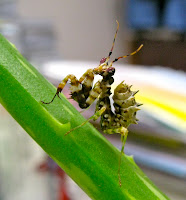 My friend G’s mantis population has expanded 300% (from 1 to 3) in 2 weeks. Before this, I thought mantises were all spindly green. It turned out many of them mimic flowers by growing spikes and patches, putting on fanciful colours, and swaying their bodies rhythmically.
My friend G’s mantis population has expanded 300% (from 1 to 3) in 2 weeks. Before this, I thought mantises were all spindly green. It turned out many of them mimic flowers by growing spikes and patches, putting on fanciful colours, and swaying their bodies rhythmically.

These mantises, at about 1-2 cm, are only babies (nymphs, to use the proper terminology). They are probably only a month old. In a few months, they will grow into adults, after a number of number moltings. They will be several inches long, similar in size to the more common mantises that we see around Hong Kong.

These tiny monsters are already voracious eaters. They grab these fruit flies, sometimes one in each claw (foreleg), in lightning-fast strikes. They start eating the fly from the head, alive. I don’t like flies, and insects in general. But I can barely stand watching the process, particularly at close-up.

Their compound eyes sometimes give the impression that their eyes have small pupils, or perhaps even that they are blind (where are the eyes?).
The green guy was really aggressive. He would wave his claws menacingly whenever anyone came close. At one point I pushed my camera to may be within 2 inches of him to get a close-up. He jumped onto my lens, and I jumped.
It is said that the female would eat the male after mating, and sometimes during. This behaviour had actually been observed in laboratories. Subsequently, other researchers claimed that the behaviour could not be observed in natural settings, and speculated that it might have been induced by the stress generated by the laboratory setting. In any case, the world of mantises is a strange one.

The world of nature is full of wonders. It is hard to imagine that it all just happened without a purpose.















